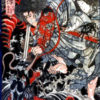Normally in Shinto belief, a family heirloom is the spiritual equivalent of a sacred relic. A family sword comes to be a kami of service and sacrifice for the betterment of the community. A family mirror comes to be a kami of reflection and awareness of both the present and the past, a keeper of sacred order. But family heirlooms don’t always behave this way. The family sword can become a kami of dishonor and blood thirst.
Family crests hold kami. Yes. Calligraphy sets came to embody spirits, as did tea sets, usually enlightened beings but sometimes not. Sometimes a haunting is not a ghost at all, but the awakened kami of the home or something in the home.
Kami seem to represent a sort of reverence, a sort of respect. Yes, divinity, but not in the “I am god and you are a miserable creature” sort of sense. Divinity in the sense of venerable authority, a generous spirit of service, even on the cosmic level. The goddess of the sun is respected not because she is a sovereign in the western sense of being the big owner of everything, but because she is a guiding influence. She preserves the gift of the sun and all that it brings to our world.
Perhaps we should bring this down to earth. If one is fortunate, they will mostly deal with normal kami in their life. Mostly their lives will be in order and healthy and prosperous with little disturbance of very much power or duration. This would be a blessed life, but the world generally doesn’t seem to favour us that well, does it?
I am not blaming the world with this statement. From time to time, and for some of us it’s more frequently than others, our lives are visited by the dark kami. It seems intelligence takes up residence with us and visits us with one misfortune or another on a chronic basis.
Even generally content people have bad days. This is true, and all kami are mobile. Followers of Shinto create shrines in their homes not because they actually contain kami, but because they serve as a seat of honour.
Are these visits “gracious” in their ways? Dark kami perceive themselves and their actions to be gracious, which raises an interesting point. In the old stories, those who seemed to come out well from misfortune, or even prosper in the face of it, were those who could treat the dark kami with respect. In more than one case, dark kami show up as beggars.
Respect = paying attention. Non-judgmental? You have it exactly, and for those who could show these “low” people no respect, they felt the curse of the kami. But for those rare individuals who did show respect to these apparently lowly beings, they not only avoided harm, but were often given gifts either of insight or even material prosperity.
If you treat sorrow as a friend, sorrow behaves like a friend, and visits you respectfully. If you treat sorrow as an enemy, then sorrow visits you as an enemy, and does to you what you do to others.
“Be grateful for everything.” And if not grateful then at least respectful. You don’t have to say you like it, just don’t fall into the pit of hate. For one thing, the kami don’t travel alone, ever. While you may seem to be communing with a kami of anger exclusively, a kami of love may be watching you very closely, and either join you soon after or avoid you based on what you chose. It’s the same as with people really.
Your thoughts are welcome. Be well friends.
Travis Saunders
Dragon Intuitive
~science,mysticism,spirituality~



Leave a Reply